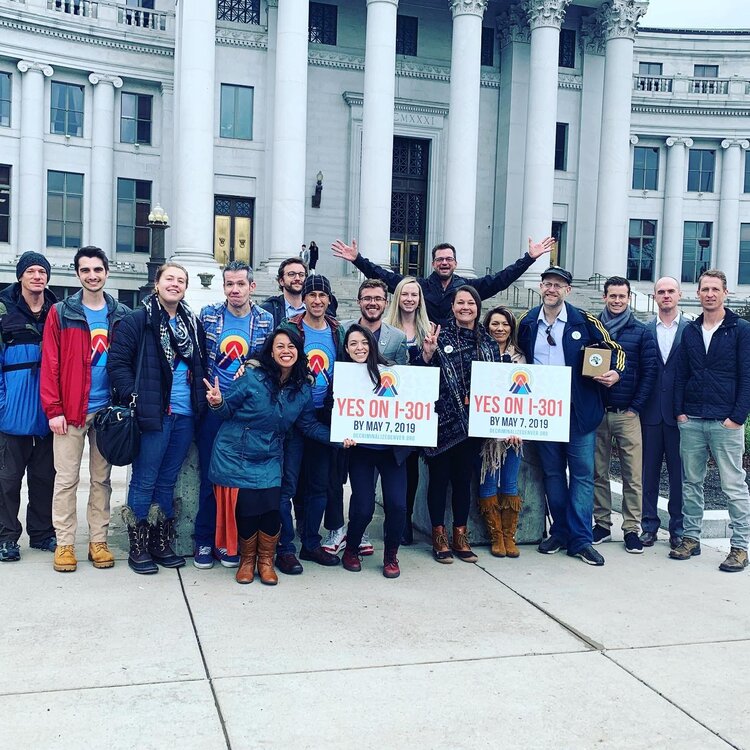The first ever Psilocybin Mushroom Policy Review Panel in the US is about to start work in Denver, Colorado. In May 2019, Denver voters approved Initiative 301 to decriminalize psilocybin mushrooms, and in doing so also required that city and county officials appoint a panel by January to review the law’s impact.
The first pressing matter facing the panel is to establish psilocybin arrest reporting criteria for the city and county police and prosecutors’ offices by March 31. I-301 decriminalized personal use and possession of psilocybin mushrooms, by making these violations the “lowest law-enforcement priority” and “[prohibiting] the city from spending resources to impose criminal penalties.”
“One of the goals of this committee is to create a reporting process that makes sense for police and prosecutors, and people who aren’t subject matter experts on psilocybin,” panel member and Denver City Councilman Chris Hinds (District 10) told Filter. “We’re creating a baseline for what psilocybin is and why we’ve decriminalized it. This process will help us understand what kind of data we need to have about this.”
The panel is composed of 11 members, including representatives from the City Council, City Attorney’s office, police and prosecutor’s offices, and experts from the substance use, harm reduction and criminal defense fields. Two members were involved in the I-301 campaign.
The mushroom panel will officially launch on January 15, and have its first meeting later in the month. Per the voter-approved initiative, the panel must meet at least quarterly, and more frequently if necessary. Members will not be compensated, and will serve three-year terms. All meetings will be open to the public. Hinds suggested the panel should be able to record or film meetings to document them for people who can’t attend in person.
It remains to be seen how psilocybin arrests will be affected by this reform. Psilocybin accounted for fewer than 1 percent of drug arrests in Denver in 2016, according to the FBI. But advocates believe that any arrest is one too many.
Crucially, I-301 did not define a quantity of mushrooms permitted for personal use. Police are instead instructed to use their discretion to determine between personal use and selling or trafficking activity. And the outcomes of this police discretion will need to be monitored. Will enforcement disproportionately target Black and Latinx people, for example?
After Colorado legalized marijuana in 2012, youth arrest rates by 2014 fell for white youths—but increased by 20 percent for Latinx and by 50 percent for Black youths.
Hinds agreed that police and relevant agencies will need to collect basic data about quantities of psilocybin confiscated, and the demographics of people arrested. And he acknowledged that marijuana legalization in Colorado has not equally benefited everyone.
“It’s important we ensure that people who are negatively affected by the War on Drugs receive as many opportunities to benefit from this as possible,” he said. “I wonder if psilocybin can have medical benefit for different communities in Denver, and it’s important for us to consider that.”
The mushroom panel must also write and submit a report to the City Council that evaluates the public safety, public health, and economic impacts of this reform. It will make recommendations about how to improve on the reform. Kevin Matthews, the director of the I-301 campaign, who is now a panel member, told Marijuana Moment in October that he wants the board to study whether psilocybin therapy can mitigate Denver’s severe mental health and substance use issues.
“In the first few months we’d like to begin training law enforcement on harm reduction techniques so that if and when they encounter anyone under the influence of psilocybin, who may be presenting as a risk to themselves or others, they have the tools and techniques to de-escalate the situation and prevent making an unnecessary arrest,” Matthews told Filter. “We’d also like to work with Denver’s Law Enforcement-Assisted Diversion [LEAD] program that diverts drug users and offenders away from jail and into short-term care and treatment.”
Matthews added that public participation in this process is key to its success. “We’d like participation on the panel to be as diverse and representative as possible,” he said. “To that end, we are creating subcommittees and will be making more appointments to those subcommittees so that more subject-matter experts and community leaders may participate and help drive equitable outcomes that benefit everyone.”
Since I-301 was approved, Matthews and his fellow activists behind the campaign have rebranded as the Society for Psychedelic Outreach, Reform, and Education (SPORE) to lobby for further reforms and collaborate with activists working on similar measures outside of Denver.
Image of Denver psilocybin activists via the Society for Psychedelic Outreach, Reform, and Education.





Show Comments